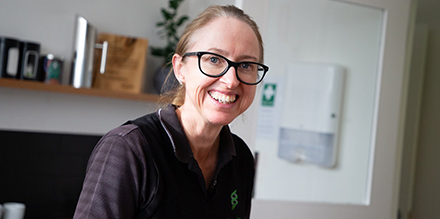The forestry industry has seen some profound changes over the last two decades. It’s altered the way companies are managed, as well as the people that are employed. SFM is a leading natural asset manager with locations across Tasmania, South Australia, Victoria and Western Australia who celebrate the diverse workforce they have built. Almost half of the team at SFM is women, a significant figure above the industry average of 28%. Source: Timberbiz
Leanne Chappell leads sustainability and compliance at SFM, after studying soil science at university, she didn’t expect forestry to be her career pathway. Ms Chappell knew she wanted to find a role in environmental science and land management, and assumed she would end up in agriculture, but when an opportunity came up in forestry she took a chance. And now, more than 25 years later, she’s never looked back.
Despite having little experience with the world of forestry at the time, Ms Chappell dived in, and was pleasantly surprised by the support and opportunities she found.
“SFM is probably the best workplace I’ve ever worked in. This comes down to the company being very family orientated and inclusive. Along with, the level of autonomy that’s afforded to staff. You can take on a role and run with it, and actually build your confidence in making decisions. You’re given opportunities to increase or develop your skills in all sorts of areas.” She said.
Ms Chappell was quick to follow new opportunities as they arose, and she appreciated the positive energy that rewarded hard work, no matter who you were.
“From what I’ve witnessed across the industry, if you want to work, and you have the right attitude, you could go anywhere. I don’t believe that there were any real barriers to women finding a place, whether it was supervising harvesting crews, or undertaking roading management, or in the silviculture area,” she said.
“I always found those environments to be really quite inclusive. You are employed to do a job, and engaged based on your ability to do that work, rather than by male to female ratios. That’s what I saw, I actually have had a really good run.
“SFM is an easy place to work. As a female in the industry, I never felt that there were any walls that you had to try and get over. It was always very respectful. If you just throw yourself into any opportunity that comes along, then you’re going to have a very rewarding career. The opportunities are there if you want to take them.”
Ms Chappell thrived in an environment that rewarded initiative and a drive to work hard, but she didn’t want that to come at the expense of having a family. In her experience, it’s the businesses that recognise the value of balancing work life with family life that have a happier, more engaged staff, and most importantly, become an employer of choice.
“From the top, the senior management group of SFM has a culture that doesn’t exclude people for where they’re at in their life, in terms of raising a family. If you’re a mum, and you’re choosing to work part time to then raise your children, that is not a barrier here,” she said.
“I think that’s probably why we’re seeing those numbers increasing here, because there are people out there that have exceptional skills, experience that will work really well in the culture and overall context of what SFM is about.”
As demand for forestry products grows, and as we rely more on new forms of technology, the range of roles in the industry is expanding. Ms Chappell has seen major shifts in the nature of work, and the different types of people it attracts.
“The interesting thing is that universities aren’t offering dedicated forestry degrees anymore. But we are still seeing women coming through, I think it’s a shift in knowledge that forestry isn’t just about cutting down trees, there is a whole whole swag of different roles,” she said.
“There are so many opportunities, whether that’s taking on a role in GIS or other more technical aspects such as carbon analytics, you don’t have to be limited to say, working with a local government, or in a mining industry, it’s transferable. You’re not limited to what you studied at university. The message is getting out there that forestry is open to anyone.”
Ms Chappell has gone from being a forestry sceptic, to being a committed forester, excited about the evolution of the space, and the opportunities that are emerging. She hopes that people will look deeper and realise it’s about more than just trees.
“I’m a classic example, I didn’t study forestry, but here I am. It’s life’s journey, it’s seeking out those opportunities, because you just don’t know what’s past that door that has forestry written on it,” Ms Chappell said.
“Once you peek inside, you realise you can see more than trees. There’s a whole world in there that can open so many different avenues for anyone that wants to come in.”
It’s not just technology that’s driving changes in the industry. As the impacts of climate change grow, forests are being recognised for their huge carbon sequestration potential, which has given rise to a further specialisation around carbon accounting, which is soon to be followed by biodiversity and natural capital accounting.
It’s a complementary business to forestry, but it requires specialist skills and an appreciation for how to operate in a new market.
“I think we’ll see that you certainly need to maintain your production levels, that’s still very important, but we’ll also look at it from a carbon perspective. It’s about your conservation values along with your production values, and it brings together both economic and social issues,” Ms Chappell said.
“Plus, we’ll also see a shift into natural capital accounting and measuring biodiversity values, they’ll be recognised as offsets as well. There’s going to be a really big push into that area.”








